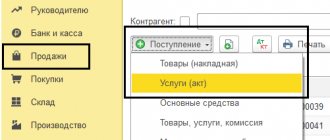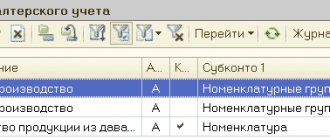The site is a computer program (Article 1261 of the Civil Code of the Russian Federation). Therefore, creating a website means developing a special computer program.
An organization can develop a website on its own (including with the involvement of third-party specialists under a copyright agreement) or contact a specialized organization.
To open a website, in addition to developing a computer program, an organization must:
- register a website domain name;
- pay for hosting services - renting space on the provider’s server where the site will be hosted.
In the tax accounting of an organization, the costs of creating a website can be taken into account as part of:
- intangible assets;
- other expenses associated with production and sales (if the organization creates a website that is not an intangible asset by a third party);
- labor costs, purchase of materials and other expenses (if the organization creates a website that is not an intangible asset, using its own resources).
Depreciation
In tax accounting, the cost of creating a website worth over 100,000 rubles. write off through depreciation (clause 1 of article 256 of the Tax Code of the Russian Federation). On the procedure for writing off in tax accounting the costs of creating a website worth 100,000 rubles. and less, see What property is considered depreciable in tax accounting.
For more information on the rules for calculating depreciation on intangible assets, see the recommendations:
- How to determine the initial cost of an intangible asset in tax accounting;
- How to calculate depreciation of intangible assets using the straight-line method in tax accounting;
- How to calculate depreciation of intangible assets using the non-linear method in tax accounting.
Expense recognition date
If an organization uses the accrual method, reduce the tax base as expenses arise for creating a website (clause 1 of Article 272 of the Tax Code of the Russian Federation). For example, take into account the cost of materials after they are written off from the warehouse, and the salaries of employees in the month of accrual. It is at this moment that expenses are recognized as economically justified (clause 1 of Article 252 of the Tax Code of the Russian Federation).
If the organization uses the cash method, reduce the tax base provided that the expenses incurred are paid (clause 3 of Article 273 of the Tax Code of the Russian Federation). For example, materials used to create a website must not only be written off, but also paid to the supplier (subclause 1, clause 3, article 273, clause 5, article 254 of the Tax Code of the Russian Federation).
Note. Since 2008, the concept of non-exclusive rights has not been used
Since January 1, 2008, issues related to rights to the results of intellectual activity and means of individualization are regulated by Part 4 of the Civil Code.
The exclusive right to the result of intellectual activity created by creative work initially arises from its author (clause 3 of Article 1228 of the Civil Code of the Russian Federation). The author may transfer this right to another person according to the agreement.
A citizen or legal entity who has an exclusive right to the result of intellectual activity or to a means of individualization are called copyright holders. They have the right to use such a result or such a means at their own discretion in any way that does not contradict the law (Clause 1 of Article 1229 of the Civil Code of the Russian Federation).
Article 1233 of the Civil Code of the Russian Federation states that the copyright holder can dispose of his exclusive right to the result of intellectual activity or to a means of individualization. In particular, he can:
— transfer the exclusive right to the other party (acquirer) in full under the alienation agreement (Article 1234 of the Civil Code of the Russian Federation);
— grant another person (licensee) the right to use the result of intellectual activity or a means of individualization within certain limits by concluding a license agreement with him (Article 1235 of the Civil Code of the Russian Federation).
According to Article 1236 of the Civil Code of the Russian Federation, licensing agreements are divided into two types:
- an agreement under which the licensee is granted the right to use the result of intellectual activity or a means of individualization, and the licensor retains the right to issue licenses to other persons - a simple (non-exclusive) license;
- an agreement granting the licensee the right to use the result of intellectual activity or a means of individualization without preserving the licensor’s right to issue licenses to other persons - an exclusive license.
Moreover, when concluding any type of license agreement, the exclusive right remains with the copyright holder and does not pass to the licensee.
Income tax: domain registration
Situation: how to reflect the costs of registering a website domain name when calculating income tax?
The accounting treatment of a domain name depends on whether the site is an intangible asset or not.
The website domain name is not an object of intellectual property (the result of intellectual activity). In addition, as an independent object, a domain name is not capable of bringing economic benefits to an organization. Therefore, the domain name is not taken into account as a separate object of intangible assets (clause 3 of Article 257 of the Tax Code of the Russian Federation).
However, without a domain name, the site cannot function. Therefore, if a website is taken into account as part of intangible assets, the costs of the initial registration of a domain name should be included in its initial cost (clause 3 of Article 257 of the Tax Code of the Russian Federation). Consider the costs of subsequent domain name registration as part of other expenses (subclause 49, clause 1, article 264 of the Tax Code of the Russian Federation).
If the website is not an intangible asset, consider the costs of both the initial and subsequent registration of a domain name as part of other expenses (subclause 49, clause 1, article 264 of the Tax Code of the Russian Federation).
If an organization uses the accrual method, then the costs of subsequent domain name registration are taken into account evenly over the entire term of the contract. If such a period is not specified in the agreement, then the costs can be taken into account at a time (i.e. at the moment when the registration authority issued documents to the organization confirming the re-registration of the domain name for a new period) (subclause 3, clause 7, article 272 Tax Code of the Russian Federation). If an organization uses the cash method, then an additional condition for recognizing the costs of re-registration of a domain name is their payment (clause 3 of Article 273 of the Tax Code of the Russian Federation).
This position is confirmed by the tax service (see, for example, letter of the Federal Tax Service of Russia for Moscow dated January 17, 2007 No. 20-12/004121).
Content:
We take into account the costs of creating a website.
The website is an intangible asset.
We determine the initial cost of the site.
Letter of the law. When the exclusive right can pass to the employee.
We calculate the amount of depreciation of the site.
Register the domain name of the site.
If the site cannot be classified as an intangible asset.
Note. Since 2008, the concept of non-exclusive rights has not been used.
Costs of hosting and promoting the site.
Income tax: advertising on the website
Situation: is it possible to take into account the costs of creating a website as part of advertising costs when calculating income tax? The website contains advertising information of the organization. A website is not an intangible asset.
Yes, you can.
If an organization’s advertising information is posted on a website, the organization has the right to take into account the costs of its creation as part of advertising costs (clause 4 of Article 264 of the Tax Code of the Russian Federation). Moreover, for calculating income tax, such expenses are accepted without restrictions. This is due to the fact that the Internet is classified as telecommunication networks (Part 8 of Article 28 of the Law of March 13, 2006 No. 38-FZ). And expenses for advertising distributed through telecommunication networks are not standardized when calculating income tax (paragraph 5, paragraph 4, article 264 of the Tax Code of the Russian Federation).
A similar point of view is reflected in letters of the Ministry of Finance of Russia dated January 29, 2007 No. 03-03-06/1/41, dated March 12, 2006 No. 03-03-04/2/54, Federal Tax Service of Russia for Moscow dated 26 August 2005 No. 20-08/60490.
An example of how the costs of creating a website are reflected in accounting and tax purposes. The organization applies a general taxation system. The organization does not have exclusive rights to the website
Alpha LLC decided to create its own website. Work on creating the site was carried out by a third party. The cost of website development was 45,000 rubles. (including VAT – 6864 rubles). The development of the site was completed (the work acceptance certificate was signed) in January 2021. Exclusive rights to the site belong to the developer organization. The site is used to post general information about the organization. According to the agreement concluded with the copyright holder, the period during which Alfa has non-exclusive rights to the site is 10 years (120 months).
Alpha pays income tax monthly and uses the accrual method to calculate tax.
Alpha's accountant reflected the costs of creating the website as follows.
In January 2021:
Debit 97 Credit 60 – 38,136 rub. (RUB 45,000 – RUB 6,864) – the costs of creating the website are reflected as deferred expenses;
Debit 19 Credit 60 – 6864 rub. – VAT is taken into account on the cost of work on creating the website;
Debit 68 subaccount “Calculations for VAT” Credit 19 – 6864 rub. – VAT is accepted for deduction on the cost of work on creating a website;
Debit 012 “Intangible assets received for use” – 45,000 rubles. – the cost of rights to the website received for use is taken into account.
In accounting, the costs of creating a website will be written off over 10 years. Every month, Alpha’s accountant will record:
Debit 26 Credit 97 – 318 rub. (RUB 38,136: 120 months) – part of the costs for creating the website for the current month was written off as expenses.
In tax accounting, the costs of creating a website are also recognized evenly over the period of use (10 years). Therefore, every month from January 2021 to December 2025 (inclusive), the accountant will contribute the costs of creating a website in the amount of 318 rubles. included in other expenses.
Cost of one hour in different studios
As for the cost of a standard hour in web studios, this figure is 20-25 dollars per hour.
Of course, you can buy back the programmer's hours for $2 per hour. Such a specialist is not registered, and therefore there are no additional costs. At the same time, they can sell it at their commercial price – $20 per hour. It is clear that in this case the company’s goal is to get an interesting contract, and it can knock off half the cost of the project from the start. The consequences of such an assessment are as follows: the deadlines will be delayed, since a programmer who is ready to work for that kind of money is most likely an inexperienced student.
Income tax: modernization
Situation: how to take into account the costs of upgrading a program (website) when calculating income tax? The program is accounted for as an intangible asset (the organization owns exclusive rights to the website).
Depending on the nature of the work being carried out, the costs of upgrading the website may be accounted for as a separate intangible asset or as the cost of updating programs.
This is explained as follows.
The site is a computer program (Article 1261 of the Civil Code of the Russian Federation). Upgrading a computer program should mean changing it. There are two types of modernization: adaptive and complete. With adaptive modernization, minor changes are made to a computer program to ensure its functionality. Complete modernization (modification) leads to the separation of the updated program into a separate object. This is stated in paragraphs 4.1, 4.5, 4.10 of GOST R ISO/IEC 14764-2002, adopted and put into effect by Resolution of the State Standard of Russia dated June 25, 2002 No. 248-st.
Thus, modification of the site, which involves changing its program code, leads to the emergence of a new object of copyright (subclause 9, paragraph 2, article 1270 of the Civil Code of the Russian Federation). That is, having modernized (reworked) the site, the organization created a new (derivative) work based on an existing one, namely a new site.
The Tax Code does not provide for a change in the initial value of intangible assets in the event of its modernization (letter of the Ministry of Finance of Russia dated December 13, 2011 No. 03-03-06/1/819).
If the new site meets the requirements for intangible assets, then take it into account as part of the intangible assets in the amount of the modernization carried out (clause 3 of article 257 of the Tax Code of the Russian Federation). Write off the cost of a new intangible asset through depreciation (clause 1 of article 256 of the Tax Code of the Russian Federation).
If a new website (copyright object) does not meet the requirements for intangible assets, or changes are made to it solely for the purpose of its functioning (changing the structure within the existing program code, correcting defects, etc.), then such costs when calculating the tax on take into account the profit as other expenses associated with production and sales, taking into account the principle of uniformity (subclause 26, clause 1, article 264, clause 1, article 272 of the Tax Code of the Russian Federation). Similar clarifications are contained in letters of the Ministry of Finance of Russia dated November 6, 2012 No. 03-03-06/1/572, dated July 19, 2012 No. 03-03-06/1/346, dated October 31, 2011 No. 03- 03-06/1/704, dated September 29, 2011 No. 03-03-06/1/601.
Letter of the law. When can an exclusive right pass to an employee?
The exclusive right to a work created within the scope of the employee’s job duties (official work) belongs to the author if the employer, within three years from the day the official work was placed at his disposal, does not perform one of the actions (Clause 2 of Art. 1295 Civil Code of the Russian Federation):
- will not start using this work;
- will not transfer the exclusive right to it to another person;
- will not inform the author about keeping the work secret.
Income tax: hosting services
When calculating income tax, include hosting services as other expenses (subclause 49, clause 1, article 264 of the Tax Code of the Russian Federation). If the site contains only advertising information, then hosting costs can be taken into account as part of advertising costs (clause 4 of Article 264 of the Tax Code of the Russian Federation).
Organizations using the accrual method include the cost of hosting in expenses at the time of receipt from the provider of documents indicating the actual provision of services (for example, an act or report) (subclause 3, clause 7, article 272 of the Tax Code of the Russian Federation). If an organization uses the cash method, then it must have documents confirming the provision of services, as well as pay for hosting services (clause 3 of Article 273 of the Tax Code of the Russian Federation).
We take a non-standard path: this is when everything works for you, but it doesn’t look very good yet
The project can be implemented differently, but for this you need to trust the developer, or have certain competencies yourself. You can start developing a website not with prototyping or design at all, but start with software development. In this case, we assemble a software framework, develop the logic for user interaction, and only then implement the design. In the case when the design comes first, designers often create complications that will then have to be paid for during implementation. That is why, when we do complex projects, such as startups, we include design only after we have built the detailed program logic of the project. This is when everything works, but it doesn’t look very good yet.
VAT
The creation of a website does not apply to construction and installation work performed by an organization for its own consumption. Therefore, there is no need to pay VAT on the costs of creating a website on your own. This follows from subparagraph 3 of paragraph 1 of Article 146 of the Tax Code of the Russian Federation.
Input VAT on costs associated with creating a website should be deducted at the time they are reflected in accounting (for example, on account 08 - for works and services, on account 10 - for materials, on account 97 - as part of deferred expenses) (p 2 Article 171, paragraph 1 Article 172 of the Tax Code of the Russian Federation, letter of the Ministry of Finance of Russia dated November 11, 2009 No. 03-07-11/295). Along with this, other conditions required for deduction must be met.
If an organization carries out both taxable and non-VAT-taxable operations and plans to use the site in both types of activities, distribute the input tax on the cost of materials (work, services) (clause 4 of Article 170 of the Tax Code of the Russian Federation).
OSNO and UTII
If an organization uses a website in activities on the general taxation system and in activities on UTII, then the costs of its creation must be distributed (clause 9 of Article 274 and clause 7 of Article 346.26 of the Tax Code of the Russian Federation). This is due to the fact that when calculating income tax, expenses related to activities on UTII cannot be taken into account. This situation is possible if, for example, the site simultaneously advertises goods that are sold both retail and wholesale. If an organization uses a website for only one type of activity, the costs of its creation do not need to be distributed.
For more information on how to distribute expenses related to both tax regimes, see How to take into account expenses for income tax when combining OSNO with UTII.
If the contractor for the creation of the site (supplier of the materials necessary to create the site) has issued an invoice, then the amount of VAT allocated in the invoice must also be distributed. For more information about this, see How to deduct input VAT when separately accounting for taxable and non-taxable transactions. The amount of VAT that cannot be deducted should be added to the share of expenses for the organization’s activities subject to UTII (subclause 3, clause 2, article 170 of the Tax Code of the Russian Federation).
How can a $20/hour rate turn into $10/hour?
Previously, we charged an average of $20 per hour. But we realized that there are times when this is inappropriate. Last year we introduced the practice of internships under the control of managers. Of course, we can't sell an intern's work for $20 an hour. And in order not to fool the client, we introduced coefficients. Initially, the coefficient is – 1. This is a rate of 20 dollars per hour. For the work of a specialist like a junior, we introduce a correction factor of 0.5, that is, 10 dollars. But we sell art director’s watches at a factor of 1.5. And this should also be reflected in the estimate.





